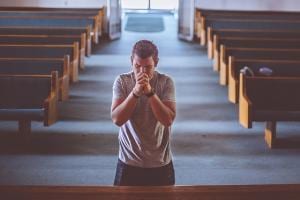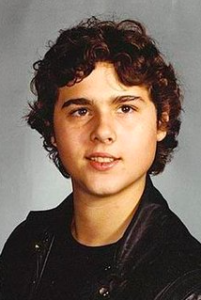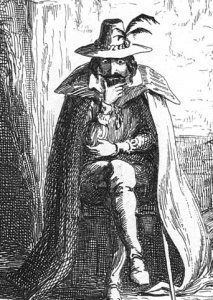THIS SERIES DEALS WITH SEXUAL ABUSE. PLEASE READ WITH CAUTION.
AN INTRODUCTION AND FURTHER DISCLAIMERS
MAY BE FOUND HERE.
O Father of lights: Remember thy people; send thy holy angels to protect and comfort thy children against the evil one; deliver us from darkness and the shadow of death, because we have cried unto thee in our misery; through Jesus Christ our Lord, who liveth and reigneth with thee and the Holy Ghost, one God, for ever and ever. Amen.
Previous installments: The Victims; The Monster and the Mirror; The Bishops’ Gambit; Pope John Paul II.
An Extra Disclaimer
This next post is hard for me to do justice to. I like Pope Benedict very much. I’ve profited enormously from his writings; his abdication shocked and saddened me, and I didn’t particularly like (or dislike) his successor for some time. In short, I want very badly to think well of the Pope Emeritus. Not that I think he’s perfect! I am not at all keen on some of his remarks and decisions with respect to homosexuality, for instance. Maintaining objectivity about him isn’t easy for me. I think justice demands I admit as much to my readers. At the same time, he’s a major figure in the report. You really can’t tell the story of McCarrick after his retirement without talking about Benedict. I’ll just have to do my best.
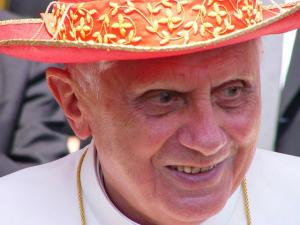
As a refresher: Pope John Paul II made Joseph Ratzinger head of the CDF (the Vatican office that defines and monitors Catholic teaching) in 1981. Ratzinger was a trusted friend and advisor to the Pope. He remained in this post until he became Pope in 2005.
So. What was Pope Benedict XVI’s role in the McCarrick scandal, before and after his election to the papacy?
Cardinal Ratzinger
The earliest interaction I know of between Ratzinger and McCarrick dates to 2004. He wrote a letter to McCarrick, restating the Church’s guidelines for giving Communion to persons who publicly reject Catholic doctrine on questions like abortion. Apparently this was a response to McCarrick’s conciliatory approach. I’m not clear whether he complied.
In the report, Ratzinger’s name first appears in a meeting of cardinals from 1997. They discussed McCarrick for Archbishop of Chicago. Cardinal O’Connor was also present, but it seems he said nothing of substance about the rumors surrounding McCarrick. What, if anything, Cardinal Ratzinger knew about McCarrick as of 1997 is therefore unclear.
In 2001, the Pope transferred authority over clerical sexual abuse to the CDF. Before this, local diocesan authorities had control of the process. Ratzinger proved much more hawkish against abuse than most bishops. He expanded the canon law definition of child abuse to cover anyone under 18, and to include offenses committed via the internet. He approved case-by-case waivers of the statute of limitations, and streamlined the process for defrocking priests guilty of abuse. As Pope, Benedict also made a point of meeting with victims of clerical abuse, a practice his predecessor neglected.
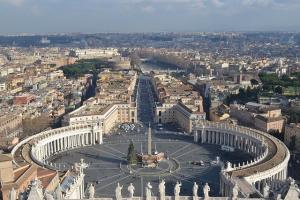
At first he stayed the course with McCarrick. He may have known less about the troubling rumors than his predecessor. Montalvo, despite his earlier objections, actually recommended that McCarrick’s term as Archbishop of Washington be extended. Cardinal O’Connor and Bishop McHugh had died in 2000. As for Bishops Hughes and Smith, they were hardly likely to incriminate themselves for years of lies—especially over a popular, influential Archbishop who was on the verge of retirement anyway. So His Holiness initially asked McCarrick to stay at his post for two more years in 2005.
McCarrick’s Retirement
Then something happened. Cardinal William Levada, the new head of the CDF, received details in June about the case of Priest 1, including the testimony of Dr. Fitzgibbons and Msgr. Cassidy. This seems to have come up in the evaluation of Priest 1’s own offenses. Cardinal Levada informed the Holy Father of these new details.
Reversing his decision about McCarrick, the Pope asked Cardinal Re to tell McCarrick to resign immediately. Re summoned him to Rome and informed him accusations had “recently reemerged” about his conduct while Bishop of Metuchen. McCarrick acceded to the resignation—though he asked that “the nomination of his successor be announced at the same time, so that his exit from Washington appears completely normal and not a punishment.” In the spring of 2006, Donald Wuerl succeeded him as the new Archbishop of Washington.
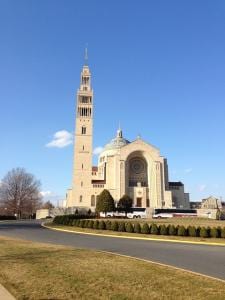
That summer a lawyer for Priest 1 met with officials from the Diocese of Metuchen and gave them information about his accusations. Reports also went to civil authorities in New Jersey, New York, Maryland, and Kentucky. Archbishop John Myers of Newark faxed this information to the Nunciature. An official made a note of the Archbishop’s worry that “‘even if they get a confidentiality agreement’—there already seems to have been such a wide distribution of the ‘incident report’ noted above that it may be actually impossible to prevent an eventual leak of the accusation.”
By January, Cardinal Tarcisio Bertone (the Secretary of State for the Vatican) had briefed the Pope about the developing situation. His Holiness was worried, and wanted McCarrick to keep a lower profile.
The Sanctions That Weren’t
However, Pope Benedict chose not to call for an investigation. There is apparently no record of any formal restrictions on McCarrick. His Holiness instead tried to appeal to McCarrick’s better nature to retire into a life of, well, retirement, rather than busying himself with USCCB affairs and constant international travel. Cardinal Re advised McCarrick to withdraw from the public eye, and to find housing that did not risk provoking the rumor mill.
This appeal to McCarrick’s conscience missed its mark. As we saw, he champed incessantly at the bit, even while circumventing much of the counsel in question. McCarrick himself remarked in a letter to the nuncio in 2008, “I did see the Holy Father … and his greeting to me was, ‘You are still traveling a lot.’ I’m not sure if he meant I am traveling too much or that he was happy that I was traveling or that it was just a friendly greeting!”
A friend from New York said McCarrick complained privately that the Pope was “basically retiring him” (an odd remark from a man who was, in fact, retired). McCarrick attributed it to a grudge on Benedict’s part due to their difference of opinion, years before, over Communion. After the accession of Francis, McCarrick even described himself as having been “put out to pasture” by Pope Benedict XVI. He did not also mention that the “pasture” in question was large enough to travel to three dozen countries in just four years.
The Sipe Letter
Here we come to Richard Sipe, a psychiatrist and former monk. Sipe researched sexuality among priests long before the abuse crisis had become a public scandal. In 1990, he published A Secret World: Sexuality and the Search for Celibacy, which suggested as many as half of all priests were sexually active. Five years later, he published Sex, Priests, and Power: Anatomy of a Crisis, which also broached the topic of the spread of AIDS among Catholic clergy.
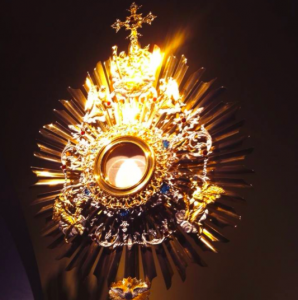
In 2008, Sipe wrote an open letter to His Holiness. He claimed not only to know of the rumors about McCarrick, but to have hard evidence and the names of several witnesses.
At least one prominent journalist at the Boston Globe was aware of McCarrick from his investigation of another priest, but until now legal documentation has not been available. And even at this point the complete story cannot be published because priest reporters are afraid of reprisals.
I know the names of at least four priests who have had sexual encounters with Cardinal McCarrick [and] have documents and letters that record the first hand testimony and eyewitness accounts of McCarrick, then Archbishop of Newark, New Jersey, actually having sex with a priest, and at other times subjecting a priest to unwanted sexual advances. …
I approach Your Holiness with due reverence, but with the same intensity that motivated Peter Damian to lay out before your predecessor, Pope Leo IX, a description of the condition of the clergy in his time. The problems he spoke of are similar and as great now in the United States as they were then in Rome. If Your Holiness requests I will submit to you personally documentation of that about which I have spoken.
The letter did not receive much press coverage, possibly because it made no allegations that McCarrick had abused minors. A copy does seem to have reached the Pope. However, what Sipe said was not new in itself; further steps were apparently deemed unnecessary.
Oh the Times, They Were a-Changin’
Some personnel changes took place in the Curia in the early 2010s. Cardinal Re, having served as head of the Congregation for Bishops for a decade, stepped down in 2010. Cardinal Marc Ouellet (formerly the Primate of Canada) replaced him. The new US Nuncio died in 2011; his replacement was one Archbishop Carlo Viganò, of whom we shall have cause to speak. Cardinal Ouellet was apparently familiar with the practices Re had asked McCarrick to observe. Ouellet communicated these guidelines to Viganò as well.
Finally, Pope Benedict announced his abdication in February of 2013. He explained he was not equal to the physical and mental demands of the Petrine throne, due to his advanced age (he was just shy of 86). As far as I can tell, His Holiness did not make any additional attempts to investigate McCarrick or rein in his public activities. He did, however, give verbal testimony for the investigation Pope Francis ordered in 2018. That produced the report we’re now reacting to.
Why Didn’t He Do More?
Why Pope Benedict XVI chose to be lenient, or whatever it was, to McCarrick—unlike the short work he made of other predators, like Maciel—is a mystery to me. Perhaps he found it hard to believe the accusations against him, given Priest 1’s own crimes. I couldn’t tell from the report whether His Holiness ever found out about the other accusers. If he didn’t, his reluctance and caution make more sense. If he did, well, that’s bitterly disappointing.
Or perhaps he worried an investigation would fall through for lack of solid evidence. That might in turn make McCarrick’s position even stronger; a previous verdict of innocence may have some force in canon law. I don’t know enough about the subject to say.
His Holiness did say, when he announced his abdication, that he felt unequal to the mental demands of the office. Maybe he sensed that he was erring somewhere, but could not figure out how to fix it. I simply don’t know.
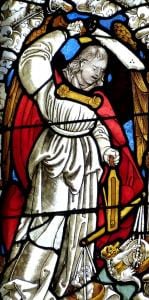
All in all: I’m less disappointed by Pope Benedict than I was afraid of, but I’m not sure I’m happy about his record either.
Further installments: Pope Francis; The Venom of Viganò; Den of Thieves; Quo Vadis


